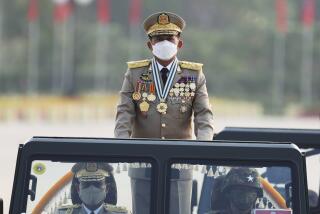Tranquil Thailand Shudders With Separatist Violence
BACHO, Thailand — The Buddhist monks at the Urairatanaram temple once lived tranquilly among the largely Muslim people of this town in southern Thailand. Today, the monastery is a military outpost, ringed with concertina wire, sandbags and machine guns.
Islamic separatists, blamed by Thai authorities for violence that has claimed 500 lives in the south over the last year, generally have targeted security personnel and local officials. But in an evident effort to spread terror, extremists also have killed Buddhist civilians, including several monks.
Responding to increasing bloodshed during 2004, the government has deployed more than 20,000 soldiers to the troubled provinces of Yala, Pattani and Narathiwat -- the only Muslim-dominated areas in Thailand, a kingdom whose people are mostly Buddhists.
The arrival of troops at the Urairatanaram monastery last spring cooled relations between local Buddhists and Muslims, villagers and monks say.
Piyanard Poowananond, 40, a Buddhist, said the few dozen Buddhist families in the area long lived harmoniously with local Muslims, but relations had deteriorated in the recent violence.
“The sense of mistrust is growing, maybe because of the heavy troop deployment,” she said. “The Muslim people do not have a good attitude toward the security forces.”
She blamed the increased frictions on some Muslims, saying she believed that most of her neighbors did not want to hurt the monks or other Buddhists.
Phra Hakaneh Hanoyolo, 35, the monastery’s abbot, also has seen Muslims distance themselves.
“The Muslim people used to come to see me and ask for my advice when they had a problem, or ask for advice on developing the village,” he said. “But ever since the soldiers made their camp here, they don’t dare to come into my temple.”
Few of the saffron-robed monks make their morning rounds anymore to collect alms without an escort of soldiers carrying assault rifles. Hakaneh said he was not afraid to perform the ritual alone, “but when the soldiers say it’s their duty to protect, I let them do it.”
Sgt. Anek Luesuwan, 43, one of the dozens of soldiers on guard in Bacho, said the troops were not looking for a fight.
“We are here to protect the Buddhist and Muslim people. We are here to keep peace and order,” he said.
The abbot, who has lived at the monastery 15 years, thinks that the Buddhists’ relations with the Muslim community will suffer for some time, but he predicts that feelings will ultimately heal.
For instance, he said, some Muslim villagers discreetly warn him not to leave the monastery at times when they expect an attack by separatists.
More to Read
Sign up for Essential California
The most important California stories and recommendations in your inbox every morning.
You may occasionally receive promotional content from the Los Angeles Times.










